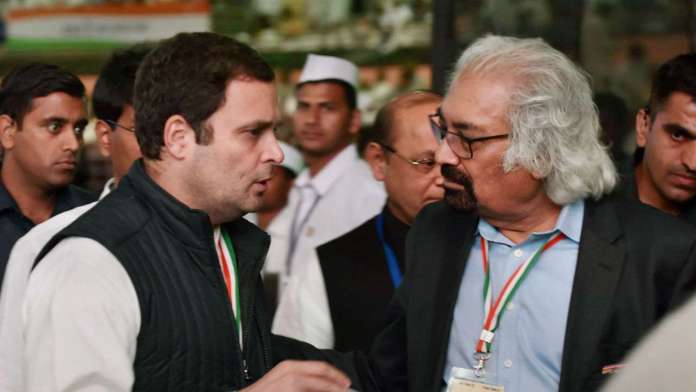


In an interview, Sam Pitroda, a close confidant of the Gandhi family, lauds the leadership qualities of Congress leader Rahul Gandhi, stating that he is more intellectual and strategic than his father Rajiv Gandhi. Pitroda also dismisses BJP's attacks on Rahul Gandhi and adds that he has all the qualities of a potential future prime minister. He also hints at Gandhi's upcoming visit to the US, where he will interact with press, think tanks, and students at Georgetown University.
Rahul Gandhi Lauded for Intellectual and Strategic Qualities
In a recent interview, Sam Pitroda, a close confidant of the Gandhi family, praised the leadership qualities of Congress leader Rahul Gandhi. Pitroda asserted that Rahul is more intellectual and strategic than his father, the late Prime Minister Rajiv Gandhi.
Pitroda's Assessment of Rahul Gandhi
Pitroda's assessment stems from his long association with the Gandhi family and his observations of Rahul's development. He believes that Rahul possesses a deep understanding of issues, a clear vision for the country, and a strong commitment to democratic values.
Pitroda also highlighted Rahul's ability to connect with people from all walks of life, making him a relatable and approachable leader. He dismissed BJP's attacks on Rahul as "political mudslinging" and expressed confidence in his potential as a future Prime Minister.
Rahul Gandhi's Upcoming US Visit
Pitroda's interview also hinted at Rahul Gandhi's upcoming visit to the United States. During this visit, Rahul is expected to interact with press, think tanks, and students at Georgetown University. It is likely that he will use this opportunity to present his vision for India and engage with key stakeholders in the US.
Top 5 FAQs and Answers
1. Who is Rahul Gandhi?
Rahul Gandhi is an Indian politician who is the current president of the Indian National Congress. He is the son of former Prime Minister Rajiv Gandhi and Sonia Gandhi.
2. What are Rahul Gandhi's key policy positions?
Rahul Gandhi is known for his commitment to social justice, economic equality, and environmental protection. He has advocated for the rights of farmers, laborers, and marginalized communities.
3. What are the main challenges facing Rahul Gandhi?
Rahul Gandhi faces a number of challenges, including the rise of the BJP, the Congress party's internal divisions, and public perception of his leadership abilities.
4. What is the significance of Rahul Gandhi's upcoming US visit?
Rahul Gandhi's upcoming US visit is important as it provides him with an opportunity to present his vision for India and engage with influential stakeholders in the US.
5. What are the possible outcomes of Rahul Gandhi's leadership?
The potential outcomes of Rahul Gandhi's leadership include a revival of the Congress party, a more inclusive and just India, and a stronger relationship between India and the US.

Congress MP Rahul Gandhi calls out the government's 'monopoly model' as responsible for IndiGo's crisis of cancelling hundreds of flights. Emphasizing the need for fair competition in all sectors, Gandhi highlights the impact on ordinary Indians who bear the brunt of delays, cancellations, and helplessness. Amid IndiGo seeking relaxation from new regulations, the Civil Aviation Minister has warned the airline to normalize its operations at the earliest.

Melania Trump, the First Lady of the United States, has revealed the Christmas decorations at the White House, focusing on American values of generosity and patriotism. She thanked the volunteers who tirelessly decorated the mansion and emphasized the message of "Home Is Where the Heart Is". The theme of this year's celebrations is a reflection of Trump's busy life as both a mother and a businesswoman. She wants to spread the message of love and grace during this holiday season.

During an exhibit at the World Trade Centre, Maharashtra BJP Minister Mangal Prabhat Lodha praised Chief Minister Devendra Fadnavis, stating that he not only runs the BJP but also controls other political outfits in the state. Shiv Sena MLA Sanjay Gaikwad disputed this claim, stating that their party is solely controlled by Deputy Chief Minister Eknath Shinde. A political observer noted the rising trend of sycophancy and cult personalities in the BJP and their eagerness to demonstrate their closeness to Fadnavis.

Congress MP Shashi Tharoor introduced a Private Member’s Bill to amend the Bharatiya Nyaya Sanhita and remove the marital rape exception, reaffirming that marriage cannot negate a woman's right to grant or deny consent. Tharoor argues that the criminalization of marital rape is an urgent necessity in India's legal system and stresses the importance of upholding constitutional values and adopting a consent standard that leaves no room for ambiguity. He emphasizes that the issue is about violence, not marriage, and asserts that all women deserve the fundamental right to bodily autonomy and dignity.

Maharashtra Chief Minister Devendra Fadnavis emphasized the need for equality beyond traditional social reservations in his interaction with orphaned young people who secured government jobs through the 1 per cent orphan reservation policy. He made this statement at his official residence in Mumbai, Varsha, while discussing the need for inclusivity and equal opportunities for all citizens. Fadnavis stressed that discrimination should not exist in any form and that all individuals should have equal opportunities to succeed.

As Prime Minister Narendra Modi marks the first anniversary of his government, opinions are divided on the performance of the BJP-led NDA government. However, global institutions and investors have shown increasing confidence in the Indian economy over the past year. Despite this, there are still important issues that need to be addressed by the Prime Minister in order to continue the successful trajectory of the country.

Union Home Minister Amit Shah spoke at the inauguration of the 60th DGsP/IGsP conference in Raipur where he stated that Naxalism in India will be fully eliminated before the next conference. He also highlighted the government's efforts in strengthening the security grid and providing permanent solutions to long-standing national security challenges. Shah emphasized the importance of intelligence and collaboration with agencies to tackle drug trafficking and organized crime. He also mentioned the strengthening of India's policing framework, making it amongst the most modern globally.

In a recent Q&A session, Professor Michael Clarke addressed the impact of a leaked call between Donald Trump's envoy and Russia on peace talks. He also discussed Putin's desire for a great legacy, which has led to a lack of pragmatism. According to Clarke, approximately 4,000 main battle tanks and 30,000 pieces of armoured equipment have been destroyed in the conflict, with Russia focusing on building more complex modern tanks. Don't miss out on these insightful answers from the expert.

Following his party's disappointing performance in the recent Bihar Assembly election, politician Prashant Kishor has raised concerns about the voting results, stating that they did not align with the public sentiment he witnessed during his campaign. Despite this setback, Kishor remains determined to build a stronger political organization and continue engaging with the public in preparation for future elections. He also addressed criticisms of his role as an election strategist, reminding critics that one loss does not define his political future.

Indian government under the leadership of Prime Minister Narendra Modi has introduced four new labour codes aimed at protecting the rights and well-being of 40 crore workers across the country. Union Minister Mansukh Mandaviya has hailed the move as transformative and a major step towards ensuring the welfare of the workforce. The new codes bring in much-needed changes such as formalisation and transparency through appointment letters, and universal social security coverage for all workers including gig and platform workers.